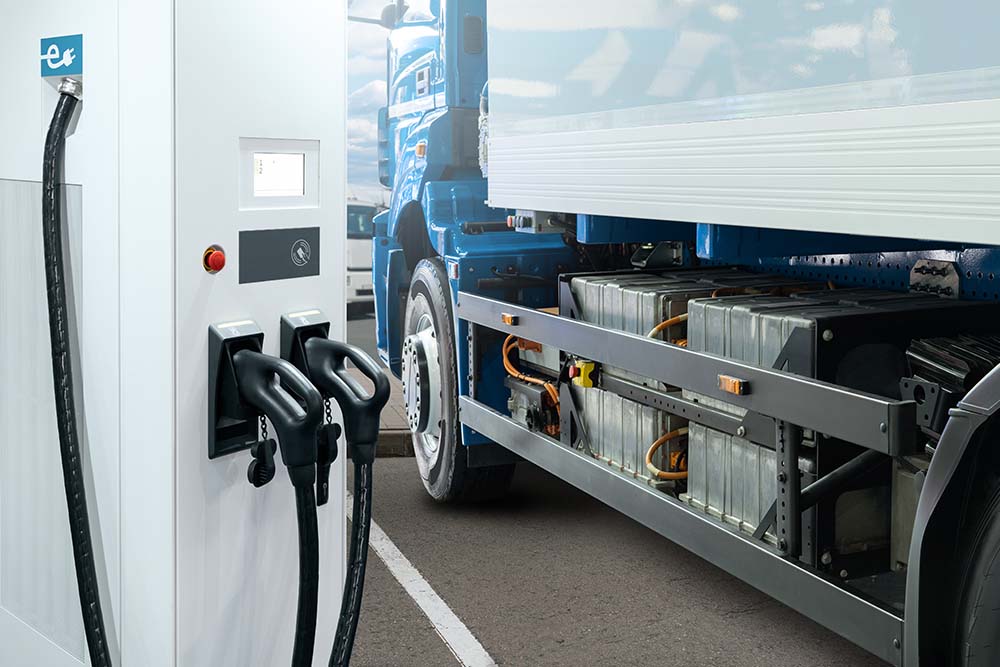What the Autumn Budget means for the logistics sector
04 Nov 24
Read more →

The government’s focus on green transportation, however, has mostly been on the electrification of cars, while seemingly ignoring the need to decarbonise HGVs. The lack of attention given to the transformation of haulage vehicles is striking – especially when one considers that 5% of the UK’s carbon dioxide emissions comes from the road freight sector.
Admittedly, there are several hurdles to overcome before businesses can fully implement electric HGVs. High costs and a lack of standardisation and regulations for e-trucks are factors holding the technology back – but perhaps most obstructive is the limited range of a battery, which makes them impractical for long-haul trips.
When managing a fleet of e-trucks in an infrastructure not yet fully optimised for electric vehicles, routes will need to be carefully planned in correlation to the sporadic charging locations. In this week’s blog, we’re exploring the challenges posed by the technological shift and the potential solutions to the problems.
As previously mentioned, the limited range of electric HGVs is the primary concern for many hauliers. Being able to only travel certain distances before requiring a recharge makes route planning difficult. To operate efficiently, businesses will need to work within the confines of the new technology – which, if not done correctly, may considerably diminish productivity.
To maximise the charge capacity of an e-truck, manufacturers have increased battery size and weight. Unfortunately, this makes the vehicle more expensive to run and reduces the payload capacity. A larger battery will also take longer to charge, which is a concern for transport managers as it can increase downtime, thus decreasing the time spent on the road.
HGVs rack up far more milage than your average commuter’s car – this extensive use causes the vehicle to degrade far quicker. Over time, the batteries will decrease in energy capacity, and therefore further limit range of the vehicle. This is a concern for transport managers as the battery will require frequent replacement, which will add extra cost to the operation.

Electric HGVs require access to charging infrastructure, such as fast-charging stations, to recharge the battery. Unfortunately, the UK’s electric vehicle (EV) charging infrastructure is still considered to be limited compared to some other countries.
While the number of charging points has been increasing, there are still areas of the country where charging infrastructure is sparse. This limited availability of charging infrastructure, especially in rural areas, can make it difficult for hauliers to operate electric vehicles on long hauls.
A TMS (Transportation Management System) can help hauliers operating electric vehicles by providing tools to optimise routes, reduce costs and improve the overall efficiency of their operations. For example, a TMS can be used to plan routes that minimize the amount of time spent driving on roads with steep inclines, which can significantly reduce the energy consumption of electric vehicles.
Additionally, a TMS can be used to monitor the battery levels of the vehicles and reroute them to charging stations as needed. This can help prevent the vehicles from running out of power while on a delivery. The real-time visibility offered by a TMS also allows the operations team to quickly respond to any issues that may arise – thereby ensuring an fleet’s electric vehicles run efficiently.
As EVs become more affordable over the coming months and years, they will become a mainstay of every haulage fleet. This is why it’s important for transport managers to prepare for the challenges created by their introduction. TrackTrans allows you to visualise your work on a map, plan routes and bring all the right jobs together into a load quickly. This gives planners all the right information they need to make informed decisions to reduce risk, running costs and your carbon footprint significantly.
Try our free demo today and get in gear for an electric future!
See how TrackTrans can be tailored to your business with no obligation. Simply complete the form and a member of our sales team will contact your directly.